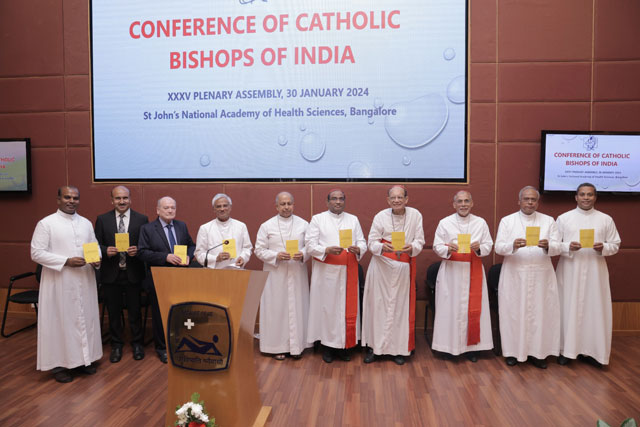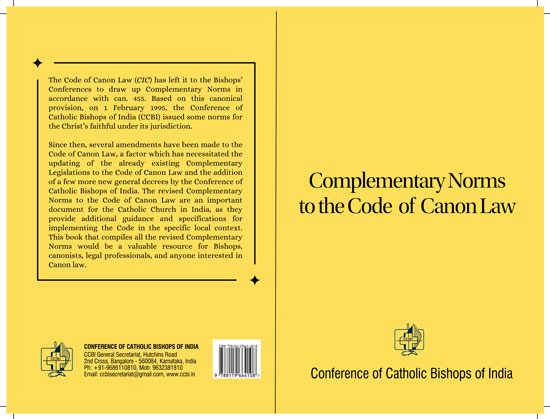Media Release
Bengaluru, Sep 29: Conference of Catholic Bishops of India, Complementary Norms to the Code of Canon Law. Bengaluru: Conference of Catholic Bishops of India, 2024. ISBN: 978-81-19664-10-8; Pages: 31.
The publication of the Complementary Norms to the Code of Canon Law by the Conference of Catholic Bishops of India (CCBI) marks a significant development in the particular law governing the Latin Church in India.


Christus Dominus in no. 38 states, ‘Decisions of the episcopal conference, provided they have been approved legitimately and by the votes of at least two-thirds of the prelates who have a deliberative vote in the conference, and have been recognized by the Apostolic See, are to have juridically binding force only in those cases prescribed by the common law or determined by a special mandate of the Apostolic See, given either spontaneously or in response to a petition of the conference itself.’
Canon 455 §§1-2 of the Code of Canon Law 1983 juridically concretises these conciliar directives, delineating the legislative authority of episcopal conferences. It stipulates that such conferences may issue general decrees only when explicitly prescribed by universal law or by a special mandate from the Apostolic See. These decrees acquire juridically binding force only after being passed by a two-thirds vote of the member bishops of the CCBI, reviewed by the Apostolic See (recognitio), and legitimately promulgated.
Consequently, the Latin Church in India, through various Plenary Assemblies of the Conference of Catholic Bishops of India (Nagpur 1984, Goa 1986, Kottayam 1988, Shillong 1989, and Bombay 1993), developed its initial Complementary Legislation, which received recognition from the Congregation for the Evangelisation of Peoples on December 2, 1994 (Prot N 5220/94).
The exigencies of canonical development and the passage of nearly twenty-five years necessitated a comprehensive revision of this existing legislation. Initiated in 2020 under the leadership of Dr Derek Fernandes, then chairman of the Canon Law Commission and Other Legislative Texts, the task of revision was entrusted to Dr Merlin Rengith Ambrose, the executive secretary of the Commission for Canon Law, CCBI, who meticulously prepared the revised draft after reviewing the entire twenty-five years of reports from the executive committee meetings and plenary assembly meetings of the CCBI spanning 1995-2021. This initial revised draft was subsequently submitted to His Eminence Oswald Cardinal Gracias on December 12, 2021, whose valuable and scholarly suggestions, aided by ten other canonists gathered in Mumbai in May 2022, were duly incorporated.
The revised and newly added forty-three general decrees underwent detailed scrutiny by the member bishops of the CCBI during four extensive sessions of the 34th Plenary Assembly, held on January 28, 2023, at St John’s National Academy of Health Sciences, Bengaluru. Under the able guidance of Dr Antonysamy Savarimuthu, the newly elected chairman of the Commission for Canon Law in 2023, Fr Merlin Rengith Ambrose diligently integrated further suggestions from the 34th Plenary Assembly. Following the Assembly’s unanimous vote, the revised Complementary Norms were submitted to the Dicastery for Evangelisation for recognition (ad normam iuris Can. 455). The Dicastery for Evangelisation, in turn, consulted the Dicastery for the Legislative Texts, which provided eight specific corrections (Prot N 18047/2023) through the Apostolic Nuncio to India and Nepal, Archbishop Leopoldo Girelli. The executive secretary incorporated these corrections, and the final revised Complementary Norms received recognition from His Eminence Luis Antonio Cardinal Tagle, Pro-Prefect of the Dicastery for Evangelisation, on August 8, 2023, through a formal decree (Prot N 2212/23).
Having secured the requisite recognitio, the revised Complementary Norms to the Code of Canon Law were formally promulgated by His Eminence Filipe Neri Cardinal Ferrão, president of the Conference of Catholic Bishops of India, on January 26, 2024. The promulgation occurred during the 35th Plenary Assembly of the CCBI on January 30, 2024, in Bengaluru, in the presence of numerous distinguished officials of the CCBI. The revised legislation officially came into force on March 19, 2024, the Solemnity of St Joseph, spouse of the Blessed Virgin Mary.
This extensive revision ensures the continued alignment of the CCBI’s Complementary Norms with the latest developments in universal Church law, while simultaneously addressing the unique socio-ecclesial context of the Catholic community in India. The Conference of Catholic Bishops of India is proud to have the latest Complementary Norms to the Code of Canon Law, based on the revised canons of the Code of Canon Law. The Complementary Norms encompass a broad spectrum of ecclesiastical governance, pastoral ministry, and the administration of Church property, providing essential clarity and guidance for dioceses, parishes, and individual faithful in navigating various legal matters.
In addition to the revised Complementary Norms, the volume includes updated figures for extraordinary administration and alienation, approved by the Dicastery for Evangelisation (Prot N 4290/22) on January 10, 2023. A circular letter from His Eminence Filipe Neri Cardinal Ferrão, dated March 8, 2023, communicating these revised financial thresholds to the Indian Church, is also featured in this book of Complementary Norms to the Code of Canon Law.
The Complementary Norms to the Code of Canon Law will serve as an invaluable resource for bishops, canonists, chancery officials, and pastoral ministers, facilitating the smooth functioning of the Church in India and enabling an effective response to the pastoral needs of the faithful, all while maintaining unwavering fidelity to the Magisterium of the Catholic Church.